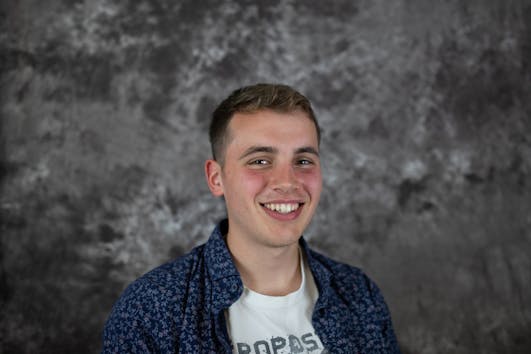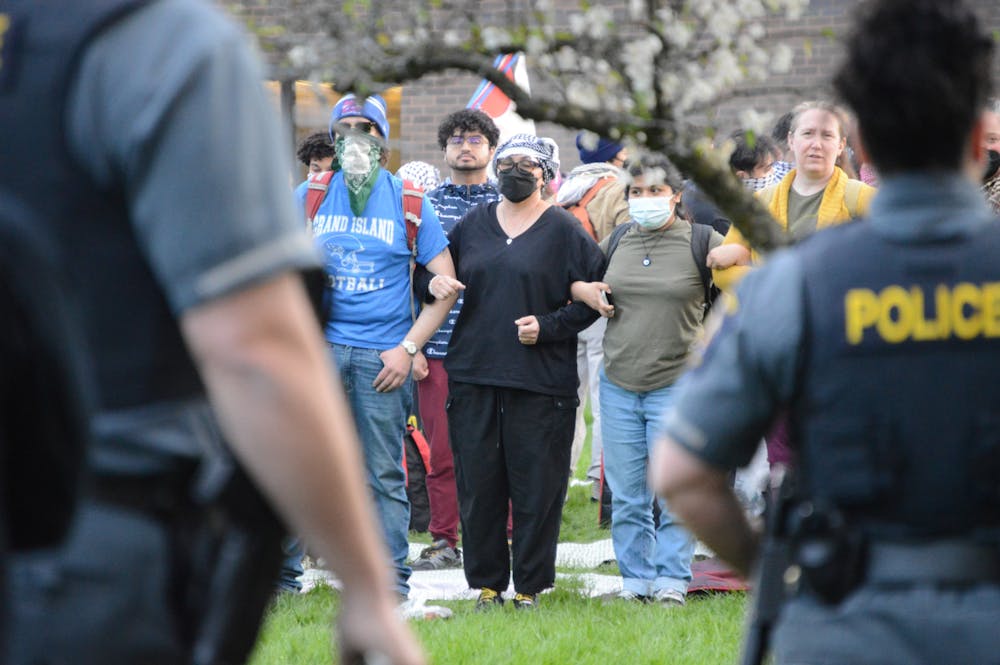Editor's note, May 5: UB originally reported that five of the 15 protesters arrested on Wednesday were students. The university's Student Conduct Office announced on Sunday that it had "discovered" that two of the protesters previously categorized as unaffiliated with UB were students. This article has been updated to include that new information, as well as to include reports from protest organizers that more demonstrators were injured.
The university revised the official number of protesters arrested at a pro-Palestine demonstration on North Campus from “approximately 16” to 15 in a statement released Thursday morning.
Seven of those arrested were UB students. The rest were unaffiliated with the university.
One arrested individual — a 67-year-old man not affiliated with the university, per a UB spokesperson — was transported to the hospital with a “minor” injury to his arm. The statement also notes that two police officers were “assaulted and treated on campus for minor injuries.”
Protest organizers say that the number of arrested protesters was higher. Hussain, a UB student and “media liaison” for SUNY Boycott, Divest, Sanction (BDS) who asked that her first name be withheld, said that her organization’s members gave rides to 18 arrested demonstrators after they were released from the Center for Tomorrow, where they were held. She also said that two protesters were hospitalized for their injuries.
Those arrested were written up for “a range of charges” that included loitering, trespass, disorderly conduct and resisting arrest, according to the university. All the arrested individuals were released with appearance tickets and will be due back in Amherst Town Court.
In its statement, the university wrote that, “based on the information available,” it “believes that individuals with no known affiliation with the university led the effort to set up an encampment” and “made up a large portion of the protestors.”
A university spokesperson later told The Spectrum that the UB Foundation "is not contemplating divestment" despite protesters' demands that it do so.
At least one of the groups that organized the protest — UB’s chapter of Students for Justice in Palestine — is a recognized UB club within the undergraduate Student Association. Another organizing group, SUNY BDS, is at least partly made up of UB students but is not officially affiliated with the university.
Other protest leaders and involved organizations were unaffiliated with the university. Our City Action Buffalo, a progressive advocacy group, encouraged Western New Yorkers to join the demonstration after it was already underway. Other non-UB affiliated demonstrators represented the Lavender Room, a Tonawanda-based arts collective and mutual aid organization.
The Graduate Student Employees Union, which represents UB’s graduate workers, said in a statement that it supported protesters’ and union members’ rights to speech and assembly.
“The world has watched Columbia, USC, and other institutions violently brutalize, arrest, and traumatize their own students and faculty — and in typical flagship-fashion, the University at Buffalo has paved the way for SUNY's violence against their own students (and student journalists) and community members,” the GSEU statement reads. “We continue to be appalled and embarrassed by our employer, and we call for all charges to be dropped against all protesters — including GSEU members who were harmed.”
Editor's note: This article has been updated to include information about the UB Foundation's decision not to contemplate divestment.
Grant Ashley is the editor in chief and can be reached at grant.ashley@ubspectrum.com
Sol Hauser is the senior news editor and can be reached at sol.hauser@ubspectrum.com

Grant Ashley is the editor in chief of The Spectrum. He's also reported for NPR, WBFO, WIVB and The Buffalo News. He enjoys taking long bike rides, baking with his parents’ ingredients and recreating Bob Ross paintings in crayon. He can be found on the platform formerly known as Twitter at @Grantrashley.





